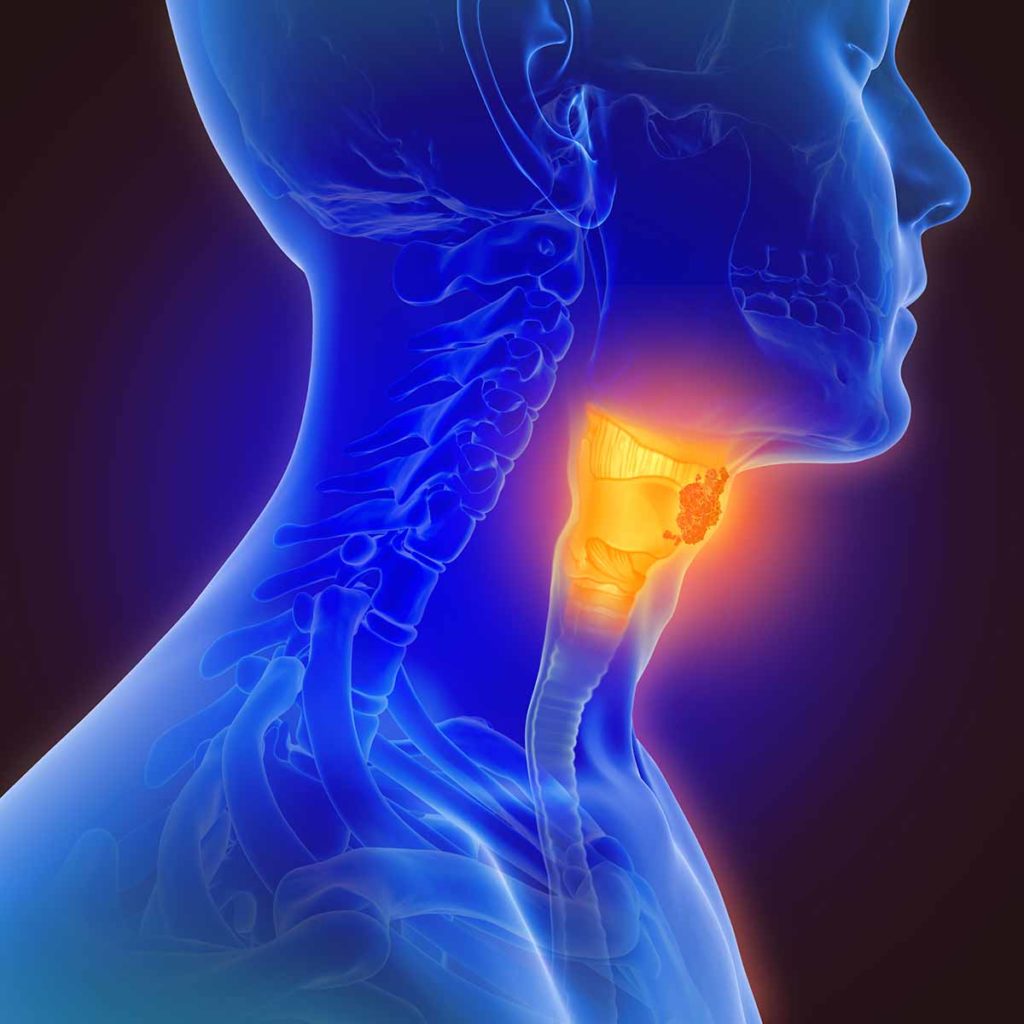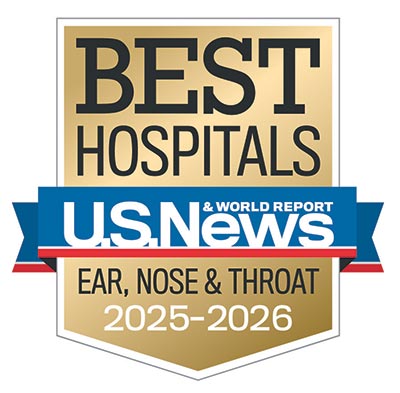Ongoing multicenter clinical trials aim to improve treatment for head and neck cancer
By participating in numerous open multicenter clinical trials, physicians and researchers at Penn State Cancer Institute continually seek ways to advance treatment for patients with head and neck cancers. All open clinical trials are associated with two nonprofit research organizations—NRG Oncology and the ECOG-ACRIN Cancer Research Group—and involve multiple centers nationwide.
“Many of the current trials we’re actively involved in seek ways to deliver the same or better outcomes by using either less aggressive or novel treatments,” said Dr. Neerav Goyal, chief, Division of Head and Neck Surgery – Otolaryngology at the Cancer Institute.

3-D illustration of throat cancer.
The Cancer Institute is participating in these ongoing phase II/III trials:
NRG-HN004 – This trial is studying how well radiation therapy works in combination with an immunotherapy medication — durvalumab or cisplatin — in treating patients with head and neck cancer that has spread to a local or regional area of the body. “This study is specific to patients who cannot tolerate cisplatin (chemotherapy), which is the current standard of care,” Goyal said. The study hopes to show whether radiation therapy with durvalumab will work better than the typical approach of radiation therapy with cisplatin.
NRG-HN005 – This trial examines whether a reduction of radiation therapy with chemotherapy or immunotherapy can be as effective in treating head and neck cancers. This and other radiation therapy-related trials share a common goal. “We know radiation therapy treats cancer, but it also causes major side effects, including difficulty swallowing, damage to the upper and lower jaw, and significant issues with neck muscles,” Goyal said. “If we can find new treatments that decrease the amount of radiation and maintain efficacy, we can reduce those side effects.”
NRG-HN006 – This trial is studying how well sentinel lymph node (SLN) biopsy surgery works compared to standard neck dissection for patients with early-stage oral cavity cancer. While standard neck dissection removes many lymph nodes in the neck, SLN uses imaging to identify the lymph nodes most likely for oral cavity cancer to spread to. Removing just the sentinel lymph nodes may allow for the removal of fewer lymph nodes while maintaining effective cancer treatment.
RTOG-1216 – This trial is examining the efficacy of radiation therapy when given together with cisplatin, docetaxel, cetuximab and/or atezolizumab after surgery for patients with high-risk stage III-IV squamous cell head and neck cancer. “The current standard of care (radiation therapy with cisplatin) is not always effective in curing these types of cancer,” Goyal said. “This trial will help us determine whether a new agent — atezolizumab — can deliver more effective treatment.”
ECOG-EA3161 – This trial is reviewing whether maintenance immunotherapy with nivolumab, following radiation and cisplatin, will result in improvements in both overall length of survival and the length of time a survivor remains cancer-free. This is specific to patients with human papillomavirus (HPV)-positive oropharynx cancer that has spread to nearby tissues or lymph nodes. “We’re hopeful that, for patients who have more advanced disease, the use of maintenance nivolumab can prevent recurrence of their cancers,” Goyal said.
Participation in these clinical trials continue a tradition of head and neck cancer research that’s been a hallmark at the Cancer Institute for nearly 20 years. “The sooner we can learn how to treat cancers more safely with less side effects, the more dramatic an improvement we’ll have on the quality and survival of patients with head and neck cancer,” Goyal said.
Recruitment is under way for patients to participate in many of the clinical trials listed above. To refer a patient to a head and neck cancer clinical trial, call 717-531-5471.

Neerav Goyal, MD, MPH, FACS
Chief, Division of Head and Neck Oncology and Surgery
Associate professor and vice chair for quality and safety, Department of Otolaryngology ─ Head and Neck Surgery
Associate professor, neurosurgery and public health sciences, Penn State College of Medicine
Phone: 717-531-6822
Email: ngoyal1@pennstatehealth.psu.edu
Fellowship: Surgical oncology, head and neck, Massachusetts Eye and Ear Infirmary, Harvard Medical School, Boston
Residency: Otolaryngology, and Otolaryngology – Head and Neck Surgery, Penn State Health Milton S. Hershey Medical Center
Medical School: Jefferson Medical College of Thomas Jefferson University, Philadelphia
Connect with Neerav Goyal, MD, MPH, FACS, on Doximity

